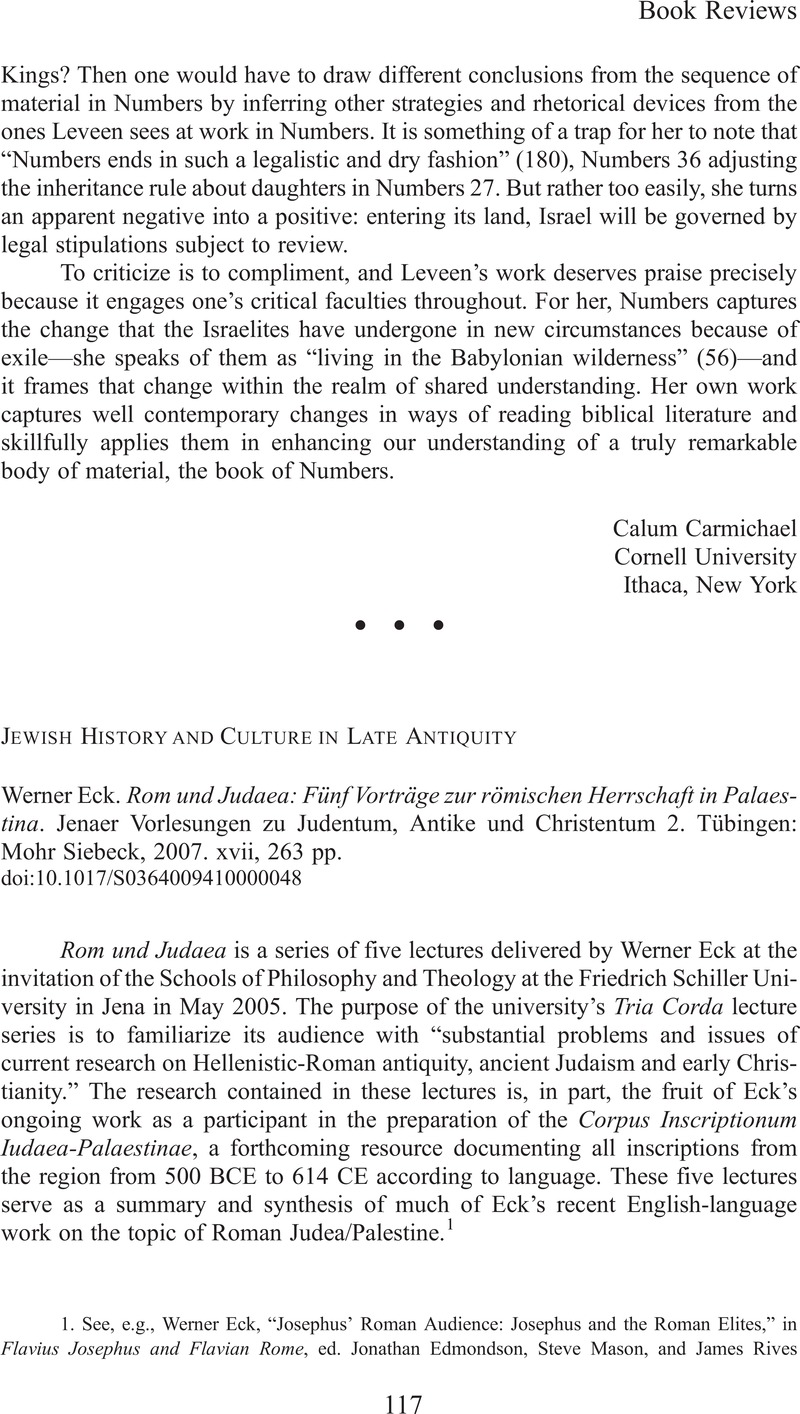No CrossRef data available.
Article contents
Werner Eck. Rom und Judaea: Fünf Vorträge zur römischen Herrschaft in Palaestina. Jenaer Vorlesungen zu Judentum, Antike und Christentum 2. Tübingen: Mohr Siebeck, 2007. xvii, 263 pp.
Published online by Cambridge University Press: 28 April 2010
Abstract

- Type
- Book Reviews: Jewish History and Culture in Late Antiquity
- Information
- Copyright
- Copyright © Association for Jewish Studies 2010
References
1. See, e.g., Eck, Werner, “Josephus' Roman Audience: Josephus and the Roman Elites,” in Flavius Josephus and Flavian Rome, ed. Edmondson, Jonathan, Mason, Steve, and Rives, James (New York: Oxford University Press, 2005), 37–62Google Scholar; idem, “The Language of Power: Latin in the Inscriptions of Iudaea/Syria Palaestina,” in Semitic Papyrology in Context, ed. Lawrence A. Schiffman (Leiden: Brill, 2003), 123–44; and idem, “The Bar Kokhba Revolt: The Roman Point of View,” Journal of Roman Studies 89 (1999): 76–89.
2. For a fuller and more developed account of the nomenclature issue, see Eck, Werner, “Die Benennung von römischen Amtsträgern und politisch-militärisch-administrativen Funktionen bei Flavius Iosephus—Probleme der korrekten Identifizierung,” Zeitschrift für Papyrologie und Epigraphik 166 (1999): 218–26Google Scholar.
3. In addition to Eck's discussion, see Barrett, Anthony, “Herod, Augustus, and the Special Relationship: The Significance of the Procuratorship,” in Herod and Augustus: Papers Presented at the IJS Conference, 21st–23rd June 2005, ed. Jacobson, David M. and Kokkinos, Nikos (Leiden: Brill, 2009), 279–302Google Scholar. Eck explains why Josephus and Tacitus use the terms praefectus (Gr. eparchos) and procurator (Gr. epitropos) so inconsistently (37). They wrote under the Flavian emperors at a time when Judea had finally become a full-fledged province. The two historians back-supplied their understanding of late first- and second-century Roman provincial administration into the records of the first century.
4. Especially interesting are the inscriptions cited by Eck (37, 45) that mention a prefect for the Decapolis and the Syrian kingdom of Commagene.
5. For example, Lucius Vitellius arrived in 36 CE to remove Pontius Pilate (Josephus, Antiquities, 18.89) and Ummidius Quadratus in 52 CE came to deal with the Judean–Samaritan disputes and to send Ventidius Cumanus to Rome (Josephus, War, 2.241–42; idem, Antiquities, 20.128–31; and Tacitus, Annales, 12.54).
6. The question of whether apostate Jews served in this military corps cannot as yet be answered.
7. See Eck, “The Bar Kokhba Revolt.”
8. Eck has no doubt that there also would have been Latin stelae present with the very same warning.
9. Contrary to the view expressed by Stefan Beyerle in his review (Journal for the Study of Judaism 40, no. 3 [2009]: 385–87), I do not see Chapter 4 (“Latein als Sprache Roms in einer vielsprachigen Welt”) as a “slight change of topic,” but as a further contextualization of the overall emphasis of the book on the nature of Roman power as it was expressed in first-century Judea.




